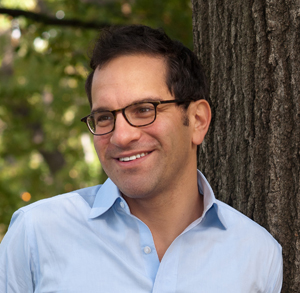Join a community of readers who are committed to Jewish stories
Sign up for JBC’s Nu Reads, a curated selection of Jewish books delivered straight to your door!
Posted by Naomi Firestone-Teeter
 Earlier this month, we heard from Marni Davis, Matti Friedman, and Sarah Bunin Benor. Today we meet Eliyahu Stern, whose first book, The Genius: Elijah of Vilna and the Making of Modern Judaism, was published earlier this year by Yale University Press.
Earlier this month, we heard from Marni Davis, Matti Friedman, and Sarah Bunin Benor. Today we meet Eliyahu Stern, whose first book, The Genius: Elijah of Vilna and the Making of Modern Judaism, was published earlier this year by Yale University Press.
Called “important and ambitious” by Tablet, The Genius presents “a new model for understanding modern Jewish history,” through the story of the “Vilna Gaon.” On top of being named a 2013 Sami Rohr Prize finalist, the title won the 2012 Samuel and Ronnie Heyman Prize for Outstanding Scholarly Publication.
Below, Eliyahu Stern discusses his newest projects, writing thank you notes, and the importance of coffee in the morning and wine in the evening to his writing:
What are some of the most challenging things about writing non-fiction?
Trying to explain why someone who lived hundreds of years ago, barely interacted with anyone, and wrote in the most severely cryptic manner is actually a hidden key to understanding current trends in American Jewry.
What or who has been your inspiration for writing non-fiction?
I remain awed by Harold Bloom’s strong and elegant prose and Charles Taylor’s ability to use his pen to engrave ideas in peoples’ minds.
Who is your intended audience?
I write for anyone interested in the core ideas and institutions that undergird present-day Jewish life.
Are you working on anything new right now?
I am working on two projects. The first is an intellectual history of Jewish nationalism in Russia. The second is a larger project on the difficult choice of deciding on a new Homeland. Following the deadly anti-Semitic attacks of 1881, Russian Jews stood at a fork in the road, weighing whether to emigrate to America or Palestine. Both lands represented something larger than one’s own life, and both promised Jews something they had never experienced, the end of anti-Semitism and the possibility of political and economic freedom. What went through peoples’ minds as they considered their options? How did their choices redefine the course of Jewish history and indeed world history?
What are you reading now?
I’ve been reading Zikhronot Bat Ami, the colorful memoir of the first great American Jewish bibliophile Ephraim Deinard. His monumental two-volume, Kohelet Amerika (1926) documented the library of American Hebrew literature published between 1735 – 1926. Deinard grew up in Lithuania in a traditional home and eventually made his way to the United States, where he played a critical role in establishing the major American Jewish libraries and publishing houses in cities ranging from Newark to New Orleans.
When did you decide to be a writer? Where were you?
After my bar mitzvah my parents told me that I was going to write thank you notes. I asked them why? They said because that’s what you are supposed to do when you receive a gift. I never choose to write; I pick up my pen when there is something that needs to be expressed.
What is the mountaintop for you — how do you define success?
Success is when people tell me something I say or write allows them to better understand their lives and the world they inhabit.
 How do you write — what is your private modus operandi? What talismans, rituals, props do you use to assist you?
How do you write — what is your private modus operandi? What talismans, rituals, props do you use to assist you?
Coffee in the morning. Wine in the evening. Music that gives my prose rhythm. Phone conversations with friends and colleagues that call my ideas into question, pushing me beyond what I put on paper that day.
What do you want readers to get out of your book?
Instead of thinking about Judaism in terms of degrees of acculturation and assimilation, I would like them to recognize the agency, genius, and creativity of the modern Jewish experience.
Eliyahu Stern is Assistant Professor of Religious Studies at Yale University. Previously, he was Junior William Golding Fellow in the Humanities at Brasenose College and the Oriental Institute, University of Oxford. His first book, The Genius: Elijah of Vilna and the Making of Modern Judaism, was published by Yale University Press in 2013 and was the recipient of The Samuel and Ronnie Heyman Prize for Outstanding Scholarly Publication. He is a Fellow of the Shalom Hartman Institute and has served as a term member on the Council on Foreign Relations, and as a consultant to the Museum of the History of Polish Jews in Warsaw, Poland.
Originally from Lancaster, Pennsylvania, Naomi is the CEO of Jewish Book Council. She graduated from Emory University with degrees in English and Art History and, in addition, studied at University College London. Prior to her role as executive director and now CEO, Naomi served as the founding editor of the JBC website and blog and managing editor of Jewish Book World. In addition, she has overseen JBC’s digital initiatives, and also developed the JBC’s Visiting Scribe series and Unpacking the Book: Jewish Writers in Conversation.